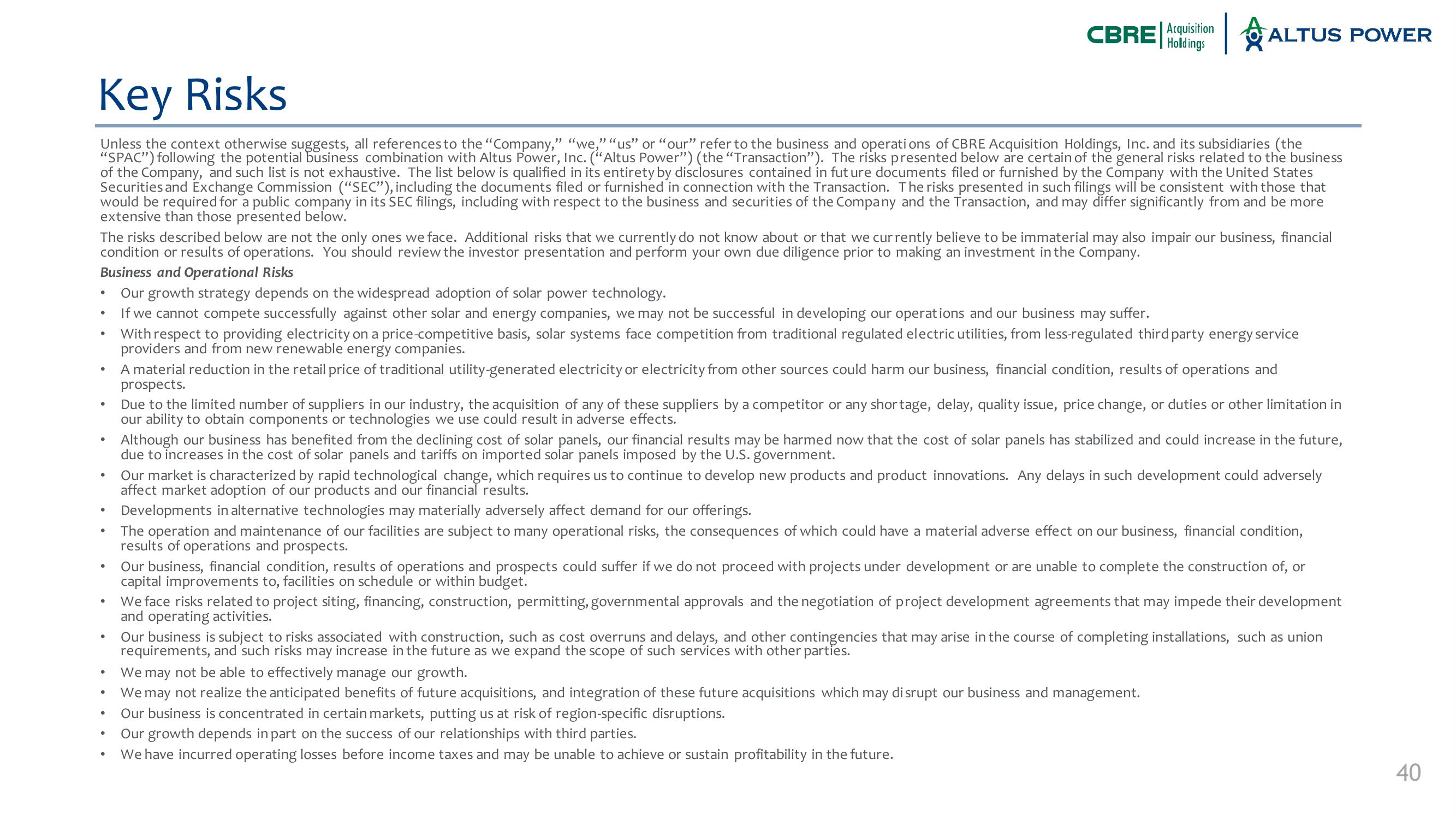Altus Power SPAC Presentation Deck
●
Key Risks
Unless the context otherwise suggests, all references to the "Company," "we," "us" or "our" refer to the business and operations of CBRE Acquisition Holdings, Inc. and its subsidiaries (the
"SPAC") following the potential business combination with Altus Power, Inc. ("Altus Power") (the "Transaction"). The risks presented below are certain of the general risks related to the business
of the Company, and such list is not exhaustive. The list below is qualified in its entirety by disclosures contained in future documents filed or furnished by the Company with the United States
Securities and Exchange Commission ("SEC"), including the documents filed or furnished in connection with the Transaction. The risks presented in such filings will be consistent with those that
would be required for a public company in its SEC filings, including with respect to the business and securities of the Company and the Transaction, and may differ significantly from and be more
extensive than those presented below.
●
The risks described below are not the only ones we face. Additional risks that we currently do not know about or that we currently believe to be immaterial may also impair our business, financial
condition or results of operations. You should review the investor presentation and perform your own due diligence prior to making investment in the Company.
Business and Operational Risks
●
●
●
●
CBRE
●
Acquisition
Holdings
ALTUS POWER
Our growth strategy depends on the widespread adoption of solar power technology.
If we cannot compete successfully against other solar and energy companies, we may not be successful in developing our operations and our business may suffer.
With respect to providing electricity on a price-competitive basis, solar systems face competition from traditional regulated electric utilities, from less-regulated third party energy service
providers and from new renewable energy companies.
A material reduction in the retail price of traditional utility-generated electricity or electricity from other sources could harm our business, financial condition, results of operations and
prospects.
Due to the limited number of suppliers in our industry, the acquisition of any of these suppliers by a competitor or any shortage, delay, quality issue, price change, or duties or other limitation in
our ability to obtain components or technologies we use could result in adverse effects.
Although our business has benefited from the declining cost of solar panels, our financial results may be harmed now that the cost of solar panels has stabilized and could increase in the future,
due to increases in the cost of solar panels and tariffs on imported solar panels imposed by the U.S. government.
Our market is characterized by rapid technological change, which requires us to continue to develop new products and product innovations. Any delays in such development could adversely
affect market adoption of our products and our financial results.
Developments in alternative technologies may materially adversely affect demand for our offerings.
The operation and maintenance of our facilities are subject to many operational risks, the consequences of which could have a material adverse effect on our business, financial condition,
results of operations and prospects.
Our business, financial condition, results of operations and prospects could suffer if we do not proceed with projects under development or are unable to complete the construction of, or
capital improvements to, facilities on schedule or within budget.
We face risks related to project siting, financing, construction, permitting, governmental approvals and the negotiation of project development agreements that may impede their development
and operating activities.
We may not be able to effectively manage our growth.
We may not realize the anticipated benefits of future acquisitions, and integration of these future acquisitions which may disrupt our business and management.
Our business is concentrated in certain markets, putting us at risk of region-specific disruptions.
Our growth depends in part on the success of our relationships with third parties.
We have incurred operating losses before income taxes and may be unable to achieve or sustain profitability in the future.
Our business is subject to risks associated with construction, such as cost overruns and delays, and other contingencies that may arise in the course of completing installations, such as union
requirements, and such risks may increase in the future as we expand the scope of such services with other parties.
40View entire presentation